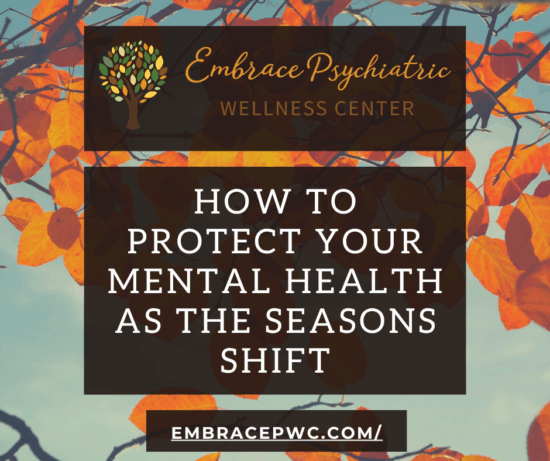
As the vibrant colors of fall begin to fade and the days grow shorter, many people notice a shift not just in the weather, but also in their mood and energy. The transition from fall to winter can bring on feelings of sadness, fatigue, or anxiety — signs that your mental health may be affected by the change in seasons. At Embrace Psychiatric Wellness Centers in Westfield and Wall, NJ, we understand how deeply these seasonal transitions can impact mental well-being.
The Connection Between Seasons and Mental Health
Reduced sunlight during the fall and winter months can disrupt the body’s internal clock, or circadian rhythm. This change can lead to fatigue, irritability, and low mood — symptoms often associated with Seasonal Affective Disorder (SAD). With fewer daylight hours, the body produces more melatonin, the hormone that regulates sleep, and less serotonin, the “feel-good” chemical that supports a stable mood. The result can be tiredness, changes in appetite, and difficulty concentrating.
“Sometimes, these mood changes are more serious and can affect how a person feels, thinks, and behaves. If you have noticed significant changes in your mood and behavior when the seasons change, you may be experiencing seasonal affective disorder (SAD).” – National Institute of Mental Health
Social isolation during colder months can further intensify these feelings. Fewer outdoor activities and shorter days can make it easy to withdraw from friends and family, increasing loneliness and decreasing motivation.
Recognizing the Signs of Seasonal Affective Disorder
Seasonal Affective Disorder is a form of depression that follows a predictable pattern each year, often beginning in late fall and lasting through winter. Common symptoms include:
- Persistent sadness or low mood
- Loss of interest in activities once enjoyed
- Low energy or fatigue
- Changes in appetite or weight
- Difficulty concentrating
- Feelings of hopelessness or guilt
- Oversleeping or excessive daytime tiredness
If these symptoms persist for more than two weeks or interfere with your daily life, it’s important to seek professional help. SAD is more than just the “winter blues” — it’s a medical condition that responds well to treatment.
Effective Treatment Options
At our mental health clinics in Westfield and Wall, NJ, we offer a range of treatments designed to help patients overcome seasonal depression and regain balance.
1. TMS Therapy: For individuals who haven’t found relief from traditional antidepressants, TMS Therapy in Westfield and Wall, NJ provides an innovative, non-invasive treatment option. Transcranial Magnetic Stimulation uses gentle magnetic pulses to stimulate areas of the brain responsible for mood regulation. This therapy is FDA-approved for depression and has shown great success in helping patients improve focus, energy, and emotional stability during the darker months.
2. Medication Management: Our experienced clinicians provide Medication Management in Westfield and Wall, NJ, ensuring that each patient receives the right type and dosage of medication for their unique needs. Selective Serotonin Reuptake Inhibitors (SSRIs) are commonly prescribed to help restore serotonin levels and reduce depressive symptoms. We carefully monitor treatment progress and make adjustments as needed for optimal results.
3. Psychotherapy and Counseling: Cognitive Behavioral Therapy (CBT) can be highly effective for SAD. Through therapy, patients learn to identify negative thought patterns and develop healthy coping strategies. Regular sessions with a psychiatrist near me in Wall, NJ, or one of our compassionate therapists, can help you build resilience and improve emotional well-being throughout the season.
Lifestyle Tips for Managing Seasonal Depression
In addition to professional care, small daily habits can make a significant difference:
- Get sunlight whenever possible: Take a walk during the brightest part of the day or sit near a sunny window.
- Maintain a routine: Go to bed and wake up at consistent times to regulate your internal clock.
- Exercise regularly: Even light physical activity releases endorphins that naturally boost mood.
- Stay socially connected: Plan regular calls or meetups with loved ones to reduce isolation.
- Eat a balanced diet: Incorporate foods rich in vitamin D, omega-3s, and lean proteins.
When to Seek Professional Help
It’s normal to have occasional low-energy days, but if you find yourself feeling persistently down, lacking motivation, or withdrawing from social activities, professional support can help you regain balance. Early intervention is key — and effective treatments are available.
At Embrace Psychiatric Wellness Center, our team of psychiatrists, nurse practitioners, and therapists are here to help you navigate the seasonal transition with compassion and evidence-based care. Whether you need TMS Therapy, Medication Management, or therapy at our Wellness Center in Westfield and Wall, NJ, we’re committed to helping you feel your best year-round.
Take the first step toward better mental health today.
Contact Embrace Psychiatric Wellness Center to schedule a consultation at our Westfield or Wall Township locations.
- Call: 908-923-3483
- Visit: embracepwc.com
Sources
- Mayo Clinic. https://www.mayoclinic.org/diseases-conditions/seasonal-affective-disorder/symptoms-causes/syc-20364651
- National Institute of Mental Health: https://www.nimh.nih.gov/health/publications/seasonal-affective-disorder
